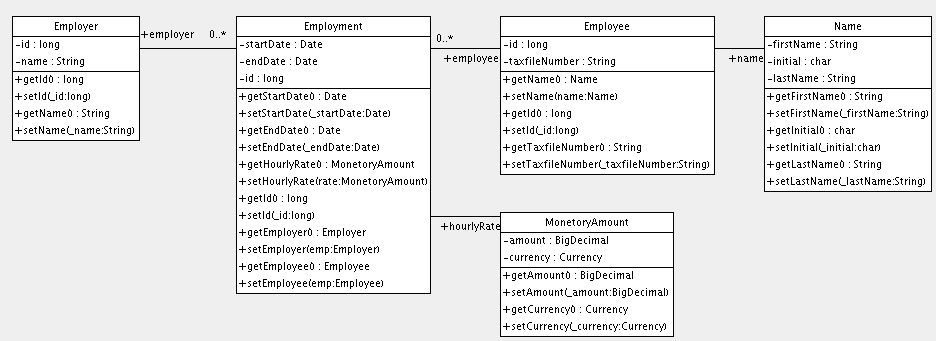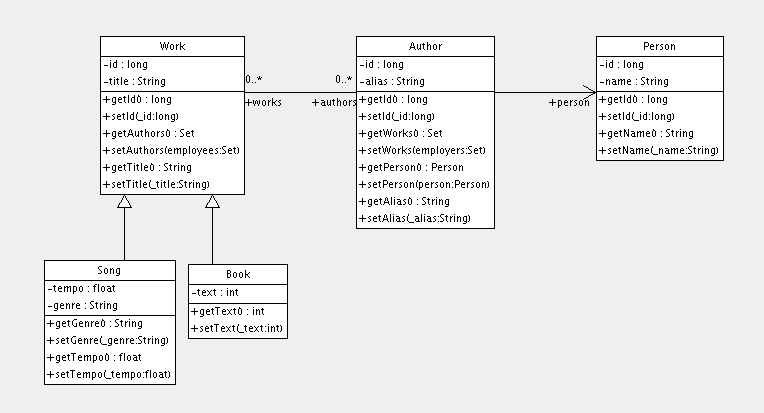Ce chapitre montre quelques mappages plus complexes.
Le modèle suivant de relation entre Employer et Employee utilise une vraie classe entité (Employment) pour représenter l'association. La raison étant qu'il peut y avoir plus d'une période d'emploi pour les deux mêmes parties. Des composants sont utilisés pour modéliser les valeurs monétaires et les noms des employés.

Voici un document de mappage possible :
<hibernate-mapping>
<class name="Employer" table="employers">
<id name="id">
<generator class="sequence">
<param name="sequence"
>employer_id_seq</param>
</generator>
</id>
<property name="name"/>
</class>
<class name="Employment" table="employment_periods">
<id name="id">
<generator class="sequence">
<param name="sequence"
>employment_id_seq</param>
</generator>
</id>
<property name="startDate" column="start_date"/>
<property name="endDate" column="end_date"/>
<component name="hourlyRate" class="MonetaryAmount">
<property name="amount">
<column name="hourly_rate" sql-type="NUMERIC(12, 2)"/>
</property>
<property name="currency" length="12"/>
</component>
<many-to-one name="employer" column="employer_id" not-null="true"/>
<many-to-one name="employee" column="employee_id" not-null="true"/>
</class>
<class name="Employee" table="employees">
<id name="id">
<generator class="sequence">
<param name="sequence"
>employee_id_seq</param>
</generator>
</id>
<property name="taxfileNumber"/>
<component name="name" class="Name">
<property name="firstName"/>
<property name="initial"/>
<property name="lastName"/>
</component>
</class>
</hibernate-mapping
>
Et voici le schéma des tables générées par SchemaExport.
create table employers (
id BIGINT not null,
name VARCHAR(255),
primary key (id)
)
create table employment_periods (
id BIGINT not null,
hourly_rate NUMERIC(12, 2),
currency VARCHAR(12),
employee_id BIGINT not null,
employer_id BIGINT not null,
end_date TIMESTAMP,
start_date TIMESTAMP,
primary key (id)
)
create table employees (
id BIGINT not null,
firstName VARCHAR(255),
initial CHAR(1),
lastName VARCHAR(255),
taxfileNumber VARCHAR(255),
primary key (id)
)
alter table employment_periods
add constraint employment_periodsFK0 foreign key (employer_id) references employers
alter table employment_periods
add constraint employment_periodsFK1 foreign key (employee_id) references employees
create sequence employee_id_seq
create sequence employment_id_seq
create sequence employer_id_seqExaminons le modèle suivant de la relation entre Work, Author et Person. Nous représentons la relation entre Work et Author comme une association plusieurs-à-plusieurs. Nous avons choisi de représenter la relation entre Author et Person comme une association un-à-un. Une autre possibilité aurait été que Author étende Person.

Le mappage suivant représente exactement ces relations :
<hibernate-mapping>
<class name="Work" table="works" discriminator-value="W">
<id name="id" column="id">
<generator class="native"/>
</id>
<discriminator column="type" type="character"/>
<property name="title"/>
<set name="authors" table="author_work">
<key column name="work_id"/>
<many-to-many class="Author" column name="author_id"/>
</set>
<subclass name="Book" discriminator-value="B">
<property name="text"/>
</subclass>
<subclass name="Song" discriminator-value="S">
<property name="tempo"/>
<property name="genre"/>
</subclass>
</class>
<class name="Author" table="authors">
<id name="id" column="id">
<!-- The Author must have the same identifier as the Person -->
<generator class="assigned"/>
</id>
<property name="alias"/>
<one-to-one name="person" constrained="true"/>
<set name="works" table="author_work" inverse="true">
<key column="author_id"/>
<many-to-many class="Work" column="work_id"/>
</set>
</class>
<class name="Person" table="persons">
<id name="id" column="id">
<generator class="native"/>
</id>
<property name="name"/>
</class>
</hibernate-mapping
>
Il y a quatre tables dans ce mappage. works, authors et persons qui contiennent respectivement les données de work, author et person. author_work est une table d'association qui lie authors à works. Voici le schéma de tables, généré par SchemaExport :
create table works (
id BIGINT not null generated by default as identity,
tempo FLOAT,
genre VARCHAR(255),
text INTEGER,
title VARCHAR(255),
type CHAR(1) not null,
primary key (id)
)
create table author_work (
author_id BIGINT not null,
work_id BIGINT not null,
primary key (work_id, author_id)
)
create table authors (
id BIGINT not null generated by default as identity,
alias VARCHAR(255),
primary key (id)
)
create table persons (
id BIGINT not null generated by default as identity,
name VARCHAR(255),
primary key (id)
)
alter table authors
add constraint authorsFK0 foreign key (id) references persons
alter table author_work
add constraint author_workFK0 foreign key (author_id) references authors
alter table author_work
add constraint author_workFK1 foreign key (work_id) references worksImaginons maintenant le modèle de relations entre Customer, Order, LineItem et Product. Il y a une association un-à-plusieurs entre Customer et Order, mais comment devons nous représenter Order / LineItem / Product ? J'ai choisi de mapper LineItem comme une classe d'association représentant l'association plusieurs-à-plusieurs entre Order et Product. Dans Hibernate, on appelle cela un élément composite.

Le document de mappage :
<hibernate-mapping>
<class name="Customer" table="customers">
<id name="id">
<generator class="native"/>
</id>
<property name="name"/>
<set name="orders" inverse="true">
<key column="customer_id"/>
<one-to-many class="Order"/>
</set>
</class>
<class name="Order" table="orders">
<id name="id">
<generator class="native"/>
</id>
<property name="date"/>
<many-to-one name="customer" column="customer_id"/>
<list name="lineItems" table="line_items">
<key column="order_id"/>
<list-index column="line_number"/>
<composite-element class="LineItem">
<property name="quantity"/>
<many-to-one name="product" column="product_id"/>
</composite-element>
</list>
</class>
<class name="Product" table="products">
<id name="id">
<generator class="native"/>
</id>
<property name="serialNumber"/>
</class>
</hibernate-mapping
>
customers, orders, line_items et products contiennent les données de customer, order, order line item et product. line_items est aussi la table d'association liant orders à products.
create table customers (
id BIGINT not null generated by default as identity,
name VARCHAR(255),
primary key (id)
)
create table orders (
id BIGINT not null generated by default as identity,
customer_id BIGINT,
date TIMESTAMP,
primary key (id)
)
create table line_items (
line_number INTEGER not null,
order_id BIGINT not null,
product_id BIGINT,
quantity INTEGER,
primary key (order_id, line_number)
)
create table products (
id BIGINT not null generated by default as identity,
serialNumber VARCHAR(255),
primary key (id)
)
alter table orders
add constraint ordersFK0 foreign key (customer_id) references customers
alter table line_items
add constraint line_itemsFK0 foreign key (product_id) references products
alter table line_items
add constraint line_itemsFK1 foreign key (order_id) references ordersCes exemples sont tous pris de la suite de tests de Hibernate. Vous en trouverez beaucoup d'autres. Regardez dans le dossier test de la distribution Hibernate.
<class name="Person">
<id name="name"/>
<one-to-one name="address"
cascade="all">
<formula
>name</formula>
<formula
>'HOME'</formula>
</one-to-one>
<one-to-one name="mailingAddress"
cascade="all">
<formula
>name</formula>
<formula
>'MAILING'</formula>
</one-to-one>
</class>
<class name="Address" batch-size="2"
check="addressType in ('MAILING', 'HOME', 'BUSINESS')">
<composite-id>
<key-many-to-one name="person"
column="personName"/>
<key-property name="type"
column="addressType"/>
</composite-id>
<property name="street" type="text"/>
<property name="state"/>
<property name="zip"/>
</class
>
<class name="Customer">
<id name="customerId"
length="10">
<generator class="assigned"/>
</id>
<property name="name" not-null="true" length="100"/>
<property name="address" not-null="true" length="200"/>
<list name="orders"
inverse="true"
cascade="save-update">
<key column="customerId"/>
<index column="orderNumber"/>
<one-to-many class="Order"/>
</list>
</class>
<class name="Order" table="CustomerOrder" lazy="true">
<synchronize table="LineItem"/>
<synchronize table="Product"/>
<composite-id name="id"
class="Order$Id">
<key-property name="customerId" length="10"/>
<key-property name="orderNumber"/>
</composite-id>
<property name="orderDate"
type="calendar_date"
not-null="true"/>
<property name="total">
<formula>
( select sum(li.quantity*p.price)
from LineItem li, Product p
where li.productId = p.productId
and li.customerId = customerId
and li.orderNumber = orderNumber )
</formula>
</property>
<many-to-one name="customer"
column="customerId"
insert="false"
update="false"
not-null="true"/>
<bag name="lineItems"
fetch="join"
inverse="true"
cascade="save-update">
<key>
<column name="customerId"/>
<column name="orderNumber"/>
</key>
<one-to-many class="LineItem"/>
</bag>
</class>
<class name="LineItem">
<composite-id name="id"
class="LineItem$Id">
<key-property name="customerId" length="10"/>
<key-property name="orderNumber"/>
<key-property name="productId" length="10"/>
</composite-id>
<property name="quantity"/>
<many-to-one name="order"
insert="false"
update="false"
not-null="true">
<column name="customerId"/>
<column name="orderNumber"/>
</many-to-one>
<many-to-one name="product"
insert="false"
update="false"
not-null="true"
column="productId"/>
</class>
<class name="Product">
<synchronize table="LineItem"/>
<id name="productId"
length="10">
<generator class="assigned"/>
</id>
<property name="description"
not-null="true"
length="200"/>
<property name="price" length="3"/>
<property name="numberAvailable"/>
<property name="numberOrdered">
<formula>
( select sum(li.quantity)
from LineItem li
where li.productId = productId )
</formula>
</property>
</class
>
<class name="User" table="`User`">
<composite-id>
<key-property name="name"/>
<key-property name="org"/>
</composite-id>
<set name="groups" table="UserGroup">
<key>
<column name="userName"/>
<column name="org"/>
</key>
<many-to-many class="Group">
<column name="groupName"/>
<formula
>org</formula>
</many-to-many>
</set>
</class>
<class name="Group" table="`Group`">
<composite-id>
<key-property name="name"/>
<key-property name="org"/>
</composite-id>
<property name="description"/>
<set name="users" table="UserGroup" inverse="true">
<key>
<column name="groupName"/>
<column name="org"/>
</key>
<many-to-many class="User">
<column name="userName"/>
<formula
>org</formula>
</many-to-many>
</set>
</class>
<class name="Person"
discriminator-value="P">
<id name="id"
column="person_id"
unsaved-value="0">
<generator class="native"/>
</id>
<discriminator
type="character">
<formula>
case
when title is not null then 'E'
when salesperson is not null then 'C'
else 'P'
end
</formula>
</discriminator>
<property name="name"
not-null="true"
length="80"/>
<property name="sex"
not-null="true"
update="false"/>
<component name="address">
<property name="address"/>
<property name="zip"/>
<property name="country"/>
</component>
<subclass name="Employee"
discriminator-value="E">
<property name="title"
length="20"/>
<property name="salary"/>
<many-to-one name="manager"/>
</subclass>
<subclass name="Customer"
discriminator-value="C">
<property name="comments"/>
<many-to-one name="salesperson"/>
</subclass>
</class
>
<class name="Person">
<id name="id">
<generator class="hilo"/>
</id>
<property name="name" length="100"/>
<one-to-one name="address"
property-ref="person"
cascade="all"
fetch="join"/>
<set name="accounts"
inverse="true">
<key column="userId"
property-ref="userId"/>
<one-to-many class="Account"/>
</set>
<property name="userId" length="8"/>
</class>
<class name="Address">
<id name="id">
<generator class="hilo"/>
</id>
<property name="address" length="300"/>
<property name="zip" length="5"/>
<property name="country" length="25"/>
<many-to-one name="person" unique="true" not-null="true"/>
</class>
<class name="Account">
<id name="accountId" length="32">
<generator class="uuid"/>
</id>
<many-to-one name="user"
column="userId"
property-ref="userId"/>
<property name="type" not-null="true"/>
</class
>